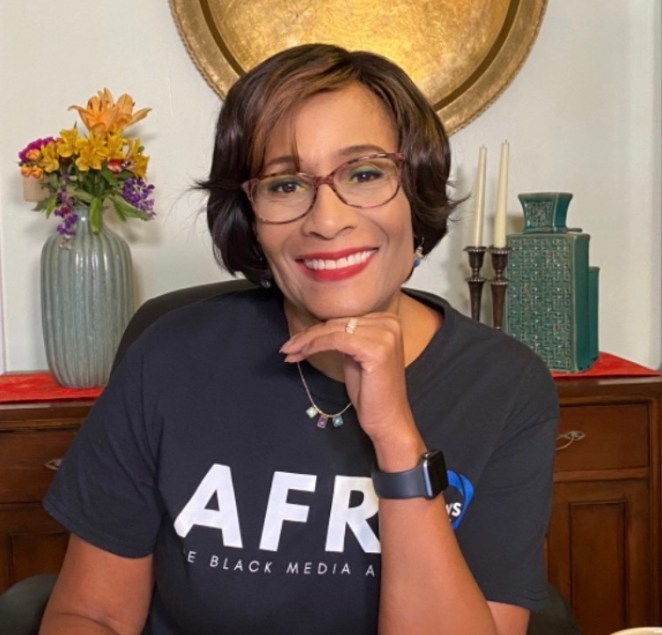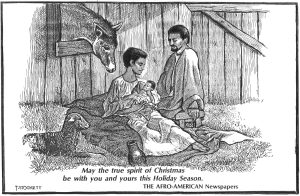
 By Frances Murphy (Toni) Draper
By Frances Murphy (Toni) Draper
CEO and Publisher
One of my all-time favorite Christmas albums is Stevie Wonder’s first Christmas album (1967) Someday at Christmas.
Someday at Christmas men won’t be boys
Playing with bombs like kids play with toys
One warm December our hearts will see
A world where men are free
Someday at Christmas there’ll be no wars
When we have learned what Christmas is for
When we have found what life’s really worth
There’ll be peace on earth.
Despite everything that’s going on in our world today, and there’s a lot going on, I still love Christmas. I love celebrating the birth of Jesus; I love singing the carols; I love Christmas decorations; I love giving (and receiving) gifts; preparing, and eating food, lots of food; I love being with family; and I love binging on Christmas movies.
Christmas means different things to different people. In the purest sense, Christmas (a combination of the words “mass” and “Christ”) commemorates the miraculous birth of Jesus Christ in Bethlehem to a man named Joseph and his virgin wife, Mary. Although no one knows the actual date of Jesus’ birth, Dec. 25 is generally the date of most Christmas celebrations. However, in some parts of the world like Egypt and Ethiopia, Christmas is not celebrated until Jan. 7.
In other African countries, Christmas traditions vary from culture to culture. According to africawanderlust.com, for example, Christmas is taken very seriously in every African nation that observes this sacred holiday (holy day). The centerpiece of most African celebrations is going to church to honor and celebrate the birth of Jesus Christ with nativity plays, carol singing and dancing. In fact, going to church is not optional in these countries. It is a public holiday observed throughout the continent. While gifts are exchanged and children are given toys in some countries, more emphasis is on caring for the needs of those who may not have food and other necessities. Further research reveals that family meals are also important.
In the East African country of Uganda, where I’ve visited several times, the church also is central to the Christmas celebration. People save all year to buy beautiful new clothes to wear to church on Christmas day. The people of Uganda are friendly, loving people who are passionate in their worship (and not just at Christmas). They spend days preparing Christmas meals and insist that you try everything, especially matooke which is sweet and soft like bananas. One thing that makes Uganda different from other countries in Africa (and perhaps around the world) is that children do not believe in Santa Claus and therefore do not look for toys and gifts. Adults do not exchange gifts either, preferring to concentrate on spending time with each other. However, colorful decorations can be seen in the cities and throughout the countryside. Visiting Kampala, Uganda reminded me of how secular Christmas has become in many places in the United States; how the true meaning of Christmas is dwarfed by luxury cars with red ribbons and a reindeer with a nose that glows; how so many in Baltimore and throughout this country are burdened by the weight of multiple pandemics that do not take a holiday: COVID 19 (with its many variants), daily violence, drug abuse, stress, financial challenges, food insecurity and structural racism just to name a few. As political, church and civic leaders struggle for answers, we continue to sing Stevie’s song:
Someday at Christmas men won’t be boys
Playing with bombs like kids play with toys
One warm December our hearts will see
A world where men are free
Someday at Christmas there’ll be no wars
When we have learned what Christmas is for
When we have found what life’s really worth
There’ll be peace on earth
Someday all our dreams will come to be
Someday in a world where men are free
Maybe not in time for you and me
But someday at Christmastime
Someday at Christmas we’ll see a land
With no hungry children, no empty hand
One happy morning people will share
Our world where people care.

And there were in the same country shepherds abiding in the field, keeping watch over their flock by night.9 And, lo, the angel of the Lord came upon them, and the glory of the Lord shone round about them: and they were sore afraid.10 And the angel said unto them, Fear not: for, behold, I bring you good tidings of great joy, which shall be to all people.11 For unto you is born this day in the city of David a Saviour, which is Christ the Lord.12 And this shall be a sign unto you; Ye shall find the babe wrapped in swaddling clothes, lying in a manger.13 And suddenly there was with the angel a multitude of the heavenly host praising God, and saying,14 Glory to God in the highest, and on earth peace, good will toward men.” (Luke 2: 8-14, KJV).
Although Uganda’s Christmas spirit might not have fully penetrated American culture, the ways and mores, the wit and wisdom, the vision of African Americans and its manifestation have left a giant mark in history. Our global imprint in the diaspora is the focus of this month’s special edition. Ralph Moore writes about architecture and rodeo; Nicole Batey about soul food and its infectious taste. Micha Green looks at the obvious influence abroad of Josephine Baker and James Baldwin. Music. Dance. Fashion. Social media. The brilliance and resilience of Africans who were uprooted and replanted on this continent continue to reverberate throughout, leaving signs of genius throughout the universe.
And. We’re. Still. Here.
Help us Continue to tell OUR Story and join the AFRO family as a member – subscribers are now members! Join here!
The post Someday at Christmas: A look into how the world celebrates appeared first on AFRO American Newspapers .










